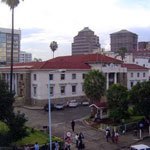
Todd Moss’ new book Minute Zero is a spellbinding political thriller set in Zimbabwe. The book features turf wars, high stakes diplomacy, conspiracy and murder.
Literary Forum by the Bookworm
It is not a genre common with local writers, but historically the country has been used as a fictional backdrop by international thriller writers such as Wilbur Smith. And the film, The Interpreter, featuring Nicole Kidman and Sean Penn also makes subtle references to Zimbabwean politics and was subsequently banned for screening.
For many people in Zimbabwe, 2008 remains a year to forget. It was a year when things came to a head with a casino economy at play, insane inflation and more significantly, it was the year in which President Robert Mugabe lost a presidential election and used violence and intimidation to cling on to power. This is the country in which a young Judd Ryker in Minute Zero is sent to troubleshoot the post-elections period.
Once on the ground in Harare, Ryker discovers that the country’s entrenched strongman, President Winston Tinotenda — who is facing Gugu Mutonga — a female opponent who’s surprisingly tough is not prepared to step down. He also makes a startling discovery that heavy foreign money is fuelling both candidates.
The impasse that took place soon after the election, the month-long wait for results and the subsequent run off have a make-believe effect, but that is what is central to the plot of Minute Zero. The Minute Zero theory touted by Ryker is based on the idea that a small window exists during an election or transition of power where outsiders can influence the outcome. Zimbabwe’s disputed elections were a moment of uncertainty for the country. What could the international community do?
There is persistent speculation that Mugabe, shell-shocked, was ready to concede defeat in 2008 and had his bags packed and the limousines warming up in the driveway, for a speedy departure to the airport. It is just that, a rumour. Some say the army intervened. There was no way the country was going to be run by MDC-T president Morgan Tsvangirai.
Youth militias were dispatched to systematically spread fear and crush any resistance. Hundreds of people were tortured, thousands of homes were burnt to the ground, and many were killed.
- Chamisa under fire over US$120K donation
- Mavhunga puts DeMbare into Chibuku quarterfinals
- Pension funds bet on Cabora Bassa oilfields
- Councils defy govt fire tender directive
Keep Reading
Minute Zero, is a sort of re-imagining of the 2008 elections and how the United States may have engaged to spark a change in power. If one is interested in how diplomacy shapes local politics, then this book is as revealing. It may be just fiction, but it gives you a peek of the behind the scenes and how diplomatic maneuvering works. Moss really excels in showing parts of the sausage-making process that is diplomacy.
The book confirms the uncomfortable influence the US government seeks to exert in foreign countries where they have interests. In Minute Zero, there is swelling speculation the country may have some of the world’s biggest deposits of uranium and may therefore pose a danger to the world, if unchecked. When that turns out to be an exaggeration, the push for change subsides. There is no doubt that Zimbabwe is way down on the list of US international priorities; had it been, the country may have been an early Libya.
Other principal characters in the book are General Simba Chimurenga who is the real power behind the throne. Not only does he direct president Tinotenda, he is also having an affair with his wife, First Lady Harriet Tinotenda. He oversees the country’s diamond transactions with shady mafia-type consortiums.
With the Zimbabwe government admitting as much as $15 billion of diamond revenue cannot be accounted for, it is not hard to see that it could have been channelled through illegal means.
In 1991, former Ethiopian leader Mengistu Haile Mariam fled his country after his country’s Supreme Court imposed a death penalty on him for committing war crimes. He has lived in Harare since, with full protection from Mugabe. His involvement in local politics is a matter of conjecture. It is not surprising that he inspires the character of General Solomon Zagwe, an exiled dictator who repays his hosts by being the mastermind of clandestine political operations that help keep president Tinotenda in power.
Moss certainly knows Africa, the State Department bureaucracy, the intelligence community and this is all evident in his story that moves between places and time zones. It is a book worth reading as it provides a unique outside perspective on the never-ending political thriller, Zimbabwe.
l Feedback: [email protected]











